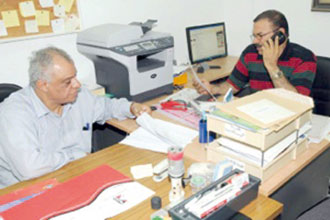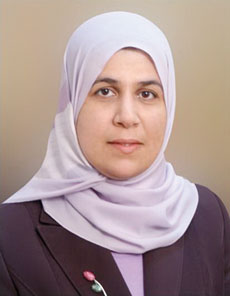
|
 |
 |
|
|
|
|
|
|
|
|
|
|
|
|
|
|
|
|
|
|
|
|
|
|
The Way Out of the Bahrain Human Rights Society CrisisHasan Moosa Shafaie On 8 September 2010, and in a sudden move, the Ministry of Social Development issued an order dissolving the Bahrain Human Rights Society’s Board of Directors, and appointed a temporary director for a period of eight months. This new administrator is an employee in the Ministry, and has been given the authority to run the affairs of the Society from its headquarters including processing applications for new memberships. This order, which was based on Law 21 of 1989 concerning societies, came as a shock to both local and international organizations, many of whom have issued statements urging the Bahraini Government to reconsider its decision.
The Ministry gave many reasons justifying this measure, including: the failure of the Society to comply with the aforementioned law including failure to prepare an annual budget; the existence of financial breaches and the receipt of money from abroad without informing the Ministry; training human rights activists from GCC countries on human rights; the failure to present final account to a Certified Accountant; engaging in politics; failing to call for a General Assembly or hold elections; failing to provide the Ministry with the minutes of the meetings of the Board of Directors. According to the Ministry, there were other complaints by citizens due to the Society’s failure to condemn violence; limiting membership to specific political groups; insulting journalists; and coordinating with illegitimate movements; mixing politics with human rights, which undermined its impartiality and professionalism; publishing statements on its website for illegal movements, which attack the political system. Finally, the Ministry outlined several irregularities in the Society’s regulations, such as the failure to renew the licence for its affiliated body (Al Karama Centre), cooperating with foreign entities, and presenting unfounded complaints to foreign organizations. The BHRS has rejected all these accusations, as well as the decision to dissolve its Board of Directors and appoint a Government administrator to run its affairs. Consequently, the Society filed a lawsuit against the Ministry’s order on 19 September 2010, to which the Ministry responded on 6 October by filing an urgent lawsuit in order to force the Society to comply with its order. However, the court did not find the Ministry`s suit urgent considering that there was already a lawsuit against the Ministry, so the latter dropped the case. On 26 October 2010, the first court held its first session to look into the BHRS’ complaints, during which the Ministry requested the case be postponed in order to study the case. The case has now been adjourned to 4 January 2011, which will allow both parties to reach a settlement, something they both seem to desire. Real irregularities and hasty measuresIt is obvious that the BHRS has made several mistakes, and some of the Ministry’s allegations are indeed true and undeniable. These mistakes include politicization of the Society, the dominance of a single political party, limiting membership, the existence of certain financial irregularities, and the failure to condemn violence for political reasons. On the other hand, some accusations were deliberately exaggerated and do not justify taking such a tough decision without previous warning. The Ministry of Social Development should act in a paternal spirit towards civil society, and should not hold it accountable for every trivial mistake. It is the duty of the Ministry to guide and not to punish. This necessitates wise behaviour, even if this requires turning a blind eye to some small breaches. It is equally important that the overall work of the organizations is correct, and it is also crucial to anticipate the effect of any decision, even if it complies with regulations, on the reform project as a whole, as well as being aware of the negative repercussions of any decision.
Punishment cannot solve the politicization problem, for anyone studying the situation in Bahrain and the political and ideological background of the leaders of civil society organizations, will understand that political and human rights projects need the time and environment to mature. Undoubtedly, the BHRS bears part of the responsibility, however, in its current situation, it cannot be separated politically from its founder: Wa‘d. I do not think that dissolving the Society is the solution, as this harms human rights and the reputation of Bahrain. We hope that human rights activists in Bahrain will realise the harm inflicted on the credibility and development of their cause, as a result of politicising human rights. We also hope that in the future, Bahraini society itself will be able to punish whoever manipulates human rights for narrow political purposes. Hence, we believe that the decision to dissolve the Society’s Board of Directors came at the wrong time, and was also executed in an incorrect manner. It was possible to deal with the problem in a different way in order to safeguard Bahrain’s reputation, by guiding and supervising the development of the BHRS, despite any legal or administrative mistakes. The Ministry in question should realise that the nature of the work of such societies obliges them to gather and publish information regarding human rights violations, and that it is the essence of their work to train and educate. Moreover, the margin of freedom in Bahrain encourages others, including countries and regional and international organizations, and even individuals, to benefit from this current openness. The problem lies in the lawThe Ministry of Social Development can refer to law 21 when addressing the breaches of the BHRS, so that its actions can be interpreted as an honest and professional implementation of that law. We also know that Law No. (21) of the year 1989 was issued long before the reform period, and that the amendments that were made to it in 2002 were not sufficient to constitute a modern law and were inadequate to meet the radical changes in Bahrain since 2001. Most Bahraini civil society organizations are not satisfied with it, and the Ministry of Social Development has realised that the law is not suitable for the current period. Therefore, the Ministry has presented a bill, which was discussed with civil society organizations, and we hope that this new bill will be urgently forwarded to the Parliament for ratification. One of the most negative points of the current law is the fact that it gives the Executive Authority extensive power to interfere directly in the details of the work of all NGOs. This makes adherence to its articles a burden for these societies, and even for the Ministry itself. This is because focusing on the details of the law, such as wanting to know everything in advance, and giving permission to all activities, is costly, time consuming and indicates a lack of trust in civil organizations. Any kind of pressure, censorship and direct interference in the internal affairs of NGOs will prevent them from achieving their objectives. Bahraini civil society organizations in general need the trust of the Government, freedom and social support in order to achieve great strides in their work. Looking for a way-out and a compromiseThe disagreement between the Ministry and the BHRS is now in the hands of the Court, and only the Court can have the final say in the decision to dissolve the Board, among other breaches. We believe that the Court rulings will be fair, and will satisfy both parties. However, we believe there is also an opportunity to resolve the issue through mutual dialogue. An impartial party such as the National Institution for Human Rights can also play a positive role in reconciling opinions, and it seems that both parties should reach a concession. We hope that the Ministry will revoke its decision, and that the BHRS addresses its irregularities in accordance with the law. |

